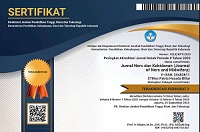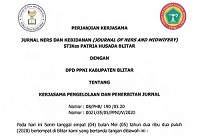Barriers and Supports in Empowering Parents Care for Children with Cancer
DOI:
https://doi.org/10.26699/jnk.v8i2.ART.p145-152Keywords:
barrier, parent empowerment, child with cancerAbstract
Cancer that occurs in children does not only affect children, but also parents. Parents experience anxiety, stress, fear of losing their children, and helplessness in caring for their children, so that parents are less than optimal in caring for their children. Parent empowerment can increase parents' knowledge, confidence, and ability to care for their children. Previous research found several obstacles to parent empowerment carried out by nurses so that parent empowerment was not optimal in its implementation. Knowing barriers and supports in implementation of parent empowerment in caring for children with cancer can support implementation of parent empowerment to be more optimal. The purpose of this study was to explore barriers and supports in parent empowerment in caring for children with cancer based on the nurse's perception. The design of this study was qualitative research design with a phenomenological approach. The data was collected by in-depth interview method using semi-structured interview guidelines on six nurses who were selected by purposive sampling technique. The data analysis was carried out by thematic analysis with the analysis stage according to Colaizzi. The results of this study were resulted in four themes, namely parental attitudes, parental characteristics, attitudes of nurses, availability of nurses and facilities. This study concluded that implementation of empowering parents to care for children with cancer became more optimal by knowing the barrier and supports in empowering parents care for children with cancer and nurses could make more effective planning in caring for children with cancer.
References
Abraham, M., Moretz, JG (2012a). Implementing patient- and family-centered care: Part I-Understanding the challenges. Pediatric Nursing, 38, 44-47.
Arumsari, DP, Emaliyawati, E., Sriati, A. Barriers to Effective Communication of Nurses with Patients 'Families in Nurses' Perspectives. (2016). Indonesian Journal of Nursing Education, 2 (2): 104–114.https://ejournal.upi.edu/index.php/JPKI/article/view/4745/3304
American Cancer Society. (2014). Cancer in Children & Adolescents https://www.cancer.org/research/cancer-facts-statistics/all-cancer-facts-figures/cancer-facts-figures-2014.html
Beddells, E., Bevan, A. (2015). Roles of nurse and parents caring for hospitaised children. Journal of Nursing Children and Young People, 28 (2), 24-28.doi: 10.7748/ncyp.28.2.24.s22.
Berube, KM, Fothergill-Bourbonnais, F., Thomas, M., Moreau, D. (2014) .Parents' Experience of the Transition with their Child from a Pediatric Intensive Care Unit (PICU) to the Hospital Ward: Searching for Comfort Across Transitions. Journal of Pediatric Nursing, 29 (6), 586–595.doi: 10.1016/j.pedn.2014.06.001
Cresswell, JW (2014). Qualitative Research & Research Design. Pustaka Pelajar: Yogyakarta.
Coyne, I., Murphy, M., Costello, T., O'Neill, C., Donnellan, C. (2013). A Survey of Nurses' Practices and Perceptions of Family-Centered Care in Ireland. Journal of Family Nursing, 19 (4), 469-488.https://doi.org/10.1177%2F1074840713508224.
Da Silva, FM, Jacob, E., Nascimento, LC (2010). Impact of Childhood Cancer on Parents Realtionship: an Integrative Review. Journal Nursing Scholarship. 42 (3): 250-61.doi: 10.1111/j.1547-5069.2010.01360.x.
Ghazavi, Z., Minooei, MS, Abdeyazdan, Z., Gheissari, A. (2014). Effect of Family Empowerment Model on Quality of Life in Children with Chronic Kidney Diseases. Iran Journal of Nursing Midwifery, 19 (4), 371-375.https://www.ncbi.nlm.nih.gov/pmc/articles/PMC4145491/
Gibbins, J., Steinhardt, K., & Beinart, H. (2012). A systematic review of qualitative studies exploring the experience of parents whose child is diagnosed and treated for cancer. Journal of Pediatric Oncology Nursing,29 (5): 253-71.doi: 10.1177/1043454212452791.
Gibson, CH (1995). The Process of Empowerment in Mothers of Chronically Il Children. Journal of Advanced Nursing, 21 (6), 1201–1210.doi: 10.1046/j.1365-2648.1995.21061201.x.
Hulme, PA (1999). Family Empowerment: A Nursing Intervention with Suggested Outcomes for Families of Children with a Chronic Health Condition ,. Journal of Family Nursing, 5 (1), 33–50.DOI:10.1177/107484079900500103.
International Union Against Cancer. (2009). Global Action Against Cancer International Union Against Cancer and World Health Organization, Geneva, 1-21. https://apps.who.int/iris/handle/10665/43203.
MacKay, LJ & Gregory, D. (2011). Exploring Family-Centered Care Among Pediatric Oncology Nurses. Journal of Pediatric Oncology Nursing.28 (1): 43-52.doi: 10.1177/1043454210377179.
National Cancer Intitute. (2015). A snapshot of pediatric cancers internationalchildhoodcancer, http: //www.cancer.gov/research.
Palliadellis, P., Cruickshank, M., Wainohu, D., Winskill, R., Stevens, H .. (2005). Implementating family centered care: an exploration of the beliefs and practices of pediatric nurses. Australian Journal of Advance Nursing, 23 (1), 31- 6. https://pubmed.ncbi.nlm.nih.gov/16496815/.
Panicker, L. (2013). Nurses' Perceptions of Parent Empowerment in Chronic Illness. Journal Contemporary Nurse. 45 (2): 210-9. doi: 10.5172/conu.2013.45.2.210.
Potts, NL, & Mandleco, BL (2012). Pediatric Nursing: Caring for Children and their families, 3 rd edition, Delmar Cengage Learning, USA.
Quinn, GP, McIntyre, J., Gonzalez, LE, Antonia, TM, Antolino, P., Wells, KJ (2013). Improving awareness of cancer clinical trials among Hispanic patients and families: audience segmentation decisions for a media intervention. Journal of Health Communication.18 (9): 1131-47. doi: 10.1080/10810730.2013.768723.
Shield, L., Zhou, H., Pratt, J., Taylor, M., Hunter, J., Pascoe, E. (2012). Family centered care for hospitalized children aged 0-12 years. Cochrane Databased of Systematic Review, 17; 10.doi: 10.1002/14651858.CD004811.pub3.
Wacharasin, C., Phaktoop, M., Sananreangsak, S. (2015). Examining the usefulness of a family empowerment program guided by the illness beliefs model for families caring for a child with thalassemia. Journal of Family Nursing, 21 (2) 295–321. https://doi.org/10.1177%2F1074840715585000.
Wigert, H., Blom, MD, Bry, K.(2014). Parents' experiences of communication with neonatal intensive-care unit staff: an interview study. BMC Pediatric.14: 304.doi: 10.1186/s12887-014-0304-5.
World Health Organization (WHO). (2014). International Childhood Cancer. http://www.who.int/life-course.






